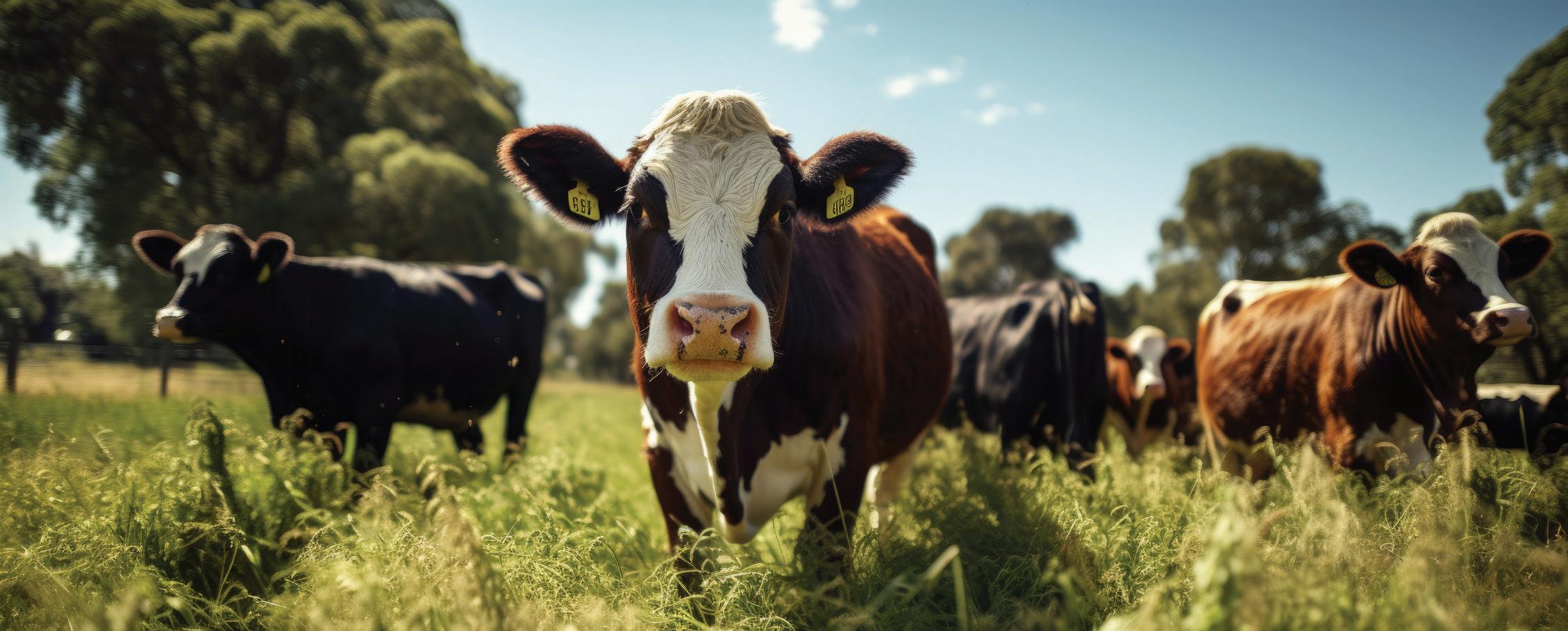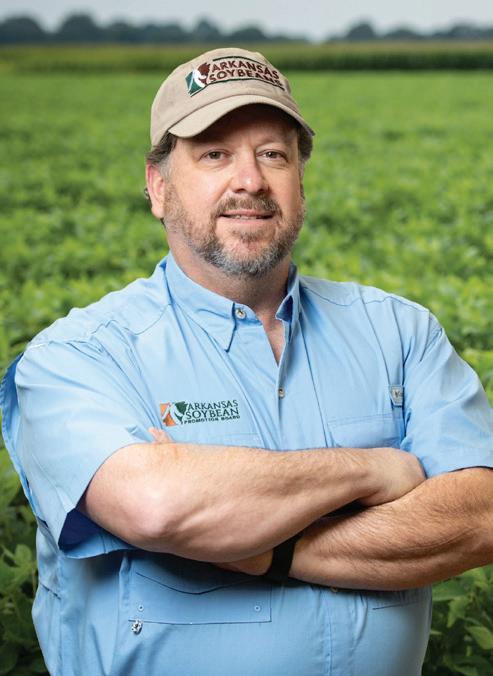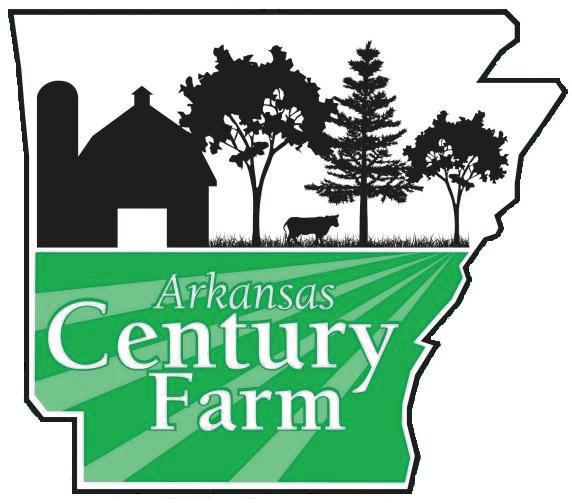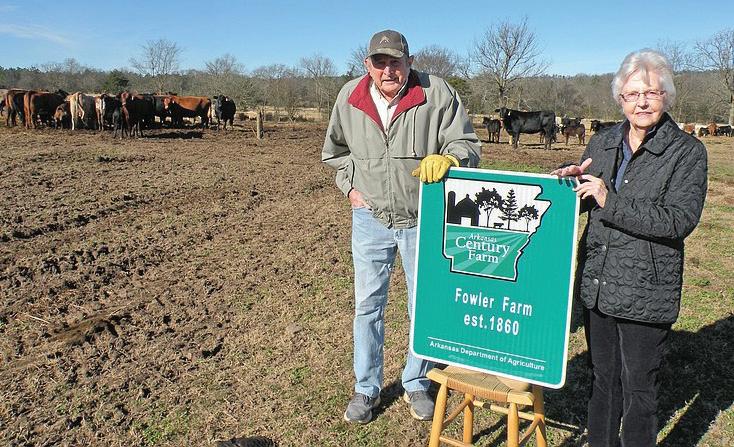Farm Bureau Press

A r FB BOARD MEMBER APPOINTED TO STATE SOYBEAN PROMOTION BOARD
Gov. Sarah Huckabee Sanders recently appointed Brad Doyle, a Poinsett County soybean producer, to the Arkansas Soybean Promotion Board (ASPB). He will serve on the board through June 30, 2025.
“The ASPB has the duty to responsibly disperse half of the funds collected from the soybean Checkoff,” said Brad Doyle. “Opportunities exist through funding proposals that are reviewed and selected with the intent to reinvest in projects that help improve sustainability and profitability on our farms.”

Doyle’s agricultural roots trace back to his greatgrandfather, who cultivated soybeans on the family farm in Cross County. After scouting soybeans and cotton in the 1990s, he returned to his family origins after meeting his wife, Joyce, and joining her family’s operation in 2001.
He graduated from Arkansas State University and later purchased his first farm in 2003. He and his wife Joyce, who received her Ph.D. in plant breeding from the University of Arkansas, grow row crops, including soybeans, for the family seed business while conducting crop and wildlife seed replicated small plot and strip trials.
Doyle is the former chairman of the American Soybean Association and remains on its board of directors. He also serves on the boards of Arkansas Farm Bureau, Arkansas Ag Council and the Natural Soybean and Grain Alliance. Additionally, as a farmer envoy for Solutions from the Land, Brad participates in United Nations COP events, advocating for sustainable agriculture practices globally.
Doyle’s goal is to use his understanding of the global soybean market and his background in soybean breeding research to help other farmers achieve a higher return on investment from their checkoff dollars.

Health Awareness Month Social Toolkit, Page 2

Flu Detected in Cattle in Eight States; Ag Department Restricts Transport into State, Page 3
Scan the QR code to access direct links referenced in each article. GET THE LINKS
MAY 3, 2024 | VOLUME 27 | ISSUE 9 A PUBLICATION OF THE ARKANSAS FARM BUREAU FEDERATION
A
PEEK INSIDE
Mental
Bird
FOLLOW
US ONLINE
Brad Doyle
ELECTRONIC IDENTIFICATION TAGS MENTAL HEALTH
AWARENESS MONTH
SOCIAL TOOLKIT
Farming is a stressful occupation that is associated with increased levels of anxiety and depression. May is Mental Health Awareness Month and to help promote awareness on this important topic, county Farm Bureaus will have access to a toolkit provided by the American Farm Bureau Federation (AFBF).
These materials focus on AFBF’s Farm State of Mind and Togetherall programs. Farm State of Mind is a campaign that builds awareness to reduce stigma and provide access to information and resources that promote farmer and rancher mental health awareness. Togetherall is a safe, anonymous online peer-to-peer community that is accessible 24/7 and moderated around the clock by licensed mental health professionals.
According to AFBF’s Farm State of Mind website, multiple studies show that farmer suicide rates are 2-5x higher than the national average. Experiences such as natural disasters, extreme weather events, financial uncertainty, fluctuating markets, labor shortages, trade disruptions and other factors all contribute to extreme stress for farmers and ranchers who often live in a very isolated setting. It is important to break the stigma around mental health challenges and encourage those struggling to reach out for help.
To build a sustainable future for agriculture for our world, we must promote the well-being of our nation’s farmers and ranchers. We are asking county Farm Bureaus to help in promoting Mental Health Awareness Month.
The toolkit is available on the ArFB Rural Health page
For more information or questions, please contact Jennifer Craig at jennifer.craig@arfb.com or 501-228-

The final rule for USDA’s Animal and Plant Health Inspection Service (APHIS) official animal identification program was released April 26. The rule will set Electronic Identification (EID) Tags as the new standard for cattle crossing state lines during interstate commerce. EID tags will replace the previously used metal band tags producers currently use. Here is a summary of what you need to know regarding the upcoming changes.
• The rule becomes effective Oct. 23.
• Applies to cattle moved across state lines that are:
o Beef cattle and bison 18 months of age or older, which are still sexually intact.
o All female dairy cattle.
o All male dairy cattle born after 2013.
o All cattle or bison being used for rodeo, recreational events, shows or exhibitions.
o Beef/dairy crosses are considered dairy cattle for this rule and therefore must be tagged with an EID tag regardless of age or spay/neuter status.
Alternative ID methods accepted in place of EID:
• Brands are acceptable if registered with a recognized brand inspection authority.
• Tattoos are acceptable if accompanied with a registration certificate from their breed association.
• Cattle with existing metal tags applied before Oct. 23.
BIRD FLU DETECTED IN CATTLE IN AG DEPARTMENT RESTRICTS TRANSPORT
As highly pathogenic avian influenza (HPAI), commonly known as bird flu, is detected in cattle in a growing number of states, the Arkansas Department of Agriculture has issued an order restricting livestock exhibiting symptoms or testing positive for the virus from entering the state.
Arkansas has seen no reports of cattle infected with the virus within its borders. Additionally, there have been no reports of bird flu in Arkansas commercial poultry production facilities or backyard “hobby flocks” since December 2023.
Per an April 5 letter from Arkansas State Veterinarian John Nilz:
• No dairy cattle exhibiting symptoms of or testing positive for HPAI shall be allowed to move into Arkansas.
• No dairy cattle from states with impacted herds shall be allowed to move into Arkansas.
• Livestock moving into Arkansas found to be in noncompliance with this order shall be quarantined to the nearest facility until all requirements are met on said animals to meet specifications.
2 A PUBLICATION OF THE ARKANSAS FARM BUREAU FEDERATION
Stronger Together #FarmStateOfMind
farmstateofmind.org
TAGS FINAL RULE SUMMARY
Not Subject to this rule
• Beef cattle or bison under 18 months of age or not sexually intact.
• Animals going directly to slaughter or an approved livestock facility and accompanied by an owner-shipper statement.
• Animals moving from farm of origin to a veterinarian (out of state) and then back to farm of origin without change in ownership.
• Animals moved directly from one state through another and back into the original state.
• Animals moved as a commuter herd (state to state) and accompanied with a commuter herd agreement from both states.
• Cattle accompanied by a brand inspection certificate as agreed upon by the shipping and receiving states.
This rule will not impact the majority of commercial cattle operations as the majority of animals being sold are either under 18 months of age, going directly to a slaughter facility, or not leaving the state upon marketing. However, when selling mature animals, producers should be aware that the rule may pertain to cows or bulls being marketed. If you have any questions, please contac Jake Cartwright at (501) 228-1475 or by email at jake.cartwright@arfb.com.
IN EIGHT STATES; TRANSPORT INTO STATE
As of April 15, USDA’s Animal and Plant Inspection Service reported confirmed cases of HPAI in cattle in eight states, including Idaho, New Mexico, Texas, South Dakota, Kansas, Michigan, Ohio and North Carolina. All of the reported cases have been in dairy milking cattle.
According to an April 16 U.S. Department of Agriculture (USDA) report, more than 8.5 million birds had been affected within the previous 30 days. While HPAI has been detected in 48 states over the last two years, it has only been reported in eight states — Michigan, Florida, New Mexico, Minnesota, Kansas, Texas, North Carolina and Maine — during that 30-day period. Many public resources are available to help individuals establish good biosecurity measures and assess the possibility of an infected herd or flock, including the United States Department of Agriculture’s HPAI biosecurity factsheet, the Division of Agriculture’s biosecurity resources page and the Arkansas Department of Health’s HPAI page. Individuals who think they may have an infected bird should consult their veterinarian or call the Arkansas Department of Agriculture at 501-823-1746.
REMINDER: 2024 ARKANSAS CENTURY FARM APPLICATIONS
DUE MAY 31
Applications for the 2024 Arkansas Century Farm Program are being accepted through May 31. The program recognizes Arkansas families who have owned and farmed the same land for at least 100 years. The program is voluntary and there is no cost to apply.

To qualify, Arkansas farms must meet the following criteria:
• The same family must have owned the farm for 100 years by Dec. 31, 2024. The line of ownership from the original settler or buyer may be through children, grandchildren, siblings, and nephews or nieces, including through marriage and adoption.
• The farm must be at least 10 acres of the original land acquisition and make a financial contribution to the overall farm income.
Qualifying Arkansas farms will receive a personalized Arkansas Century Farm certificate and metal sign listing the farm name and year established.
Online and printable applications are available here. To be eligible for designation as a 2024 inductee applications must be received via email at beth. moore@agriculture.arkansas.gov or postmarked on or before May 31.
For questions, contact Beth Moore at (501) 539-4027.

3 A PUBLICATION OF THE ARKANSAS FARM BUREAU FEDERATION
Photo Credit: Arkansas Democrat-Gazette.
MARKET NEWS
as of May 1, 2024
Contact Brandy Carroll brandy.carroll@arfb.com
Tyler Oxner tyler.oxner@arfb.com
Corn
Corn prices have experienced minor increases recently, largely influenced by wheat prices. Nonetheless, prices appear to be stabilizing once more as market concerns about weather diminish. Dec24 corn has dipped below the critical support level of its 20-day moving average of $4.67. Although there are still chances of rain in key corn-growing regions, potentially slowing planting progress in the short term, dry conditions in the Eastern Corn Belt could facilitate enough planting to counteract delays in the west. As of Sunday, U.S. planting progress reached 27%, surpassing both last year’s 23% and the five-year average of 22%. Additionally, 7% of the crop has emerged, slightly above recent trends.
Soybean
Similar to corn, Nov24 soybean prices recently saw some gains before retracting this week. They have now dropped below both the 20 and 50day moving averages, which served as crucial support levels. Looking at the chart, the next support level for Nov24 would likely be around $11.50. The recent downward pressure may stem from the swift resolution of Argentina’s two-day port workers’ strike. As the world’s largest soymeal exporter, Argentina’s strike threatened to disrupt global trade flows, potentially boosting U.S. soymeal exports had it persisted. As of Sunday, U.S. planting progress reached 18% completion, surpassing last year’s 16% and the five-year average of 10%. Arkansas leads among the 18 reporting states, with 56%
completion, ahead of 40% last year and the five-year average of 23%.
Wheat
Recent weeks saw nearby wheat prices reaching overbought levels, halting their upward trajectory. After peaking at $6.04 last week, the May contract retreated below $6. Support is anticipated around the 20-day moving average at $5.65, with last week’s high serving as resistance. This downward movement is mainly attributed to the overbought status and alleviated weather concerns in the Black Sea and the U.S. plains, at least for now. Winter wheat conditions experienced a 1% decline, with 49% of the nation’s crop rated as good to excellent. Arkansas maintains strong conditions, with 66% of its winter wheat rated as good to excellent, and only 4% categorized as poor.
Cotton
Cotton futures have been under significant pressure and the charts have taken on an extremely bearish appearance. July futures set a new 10-month low on Tuesday. The next level of support is 77.60 cents. New crop December has fallen to 5-month lows and has support below 77 cents. Weaker crude oil prices and a stronger dollar have hurt export demand for cotton. Planting is just beginning across most of the cotton belt, with 15% of the crop in the ground. Arkansas farmers have planted 14%, well ahead of the 5-year average of 6%. While it is very early, conditions are favorable for a good crop. Good moisture levels prevail across the southeast, while west Texas isn’t as dry as the past few years have been.
Rice
Rice planting is already starting to wind down, well ahead of the usual pace. Arkansas farmers have planted 83% of the crop, compared to a 5-year average of 43% for the same week. 54% of the crop has emerged, while the 5-year average is 19%. Nationwide, 72% of the crop is in the ground, while the previous 5-year average is
46%. Old crop futures are trading near contract-high levels, below support at the high of $19.61. Impressive export demand and a disappointing South American harvest are supporting factors. New crop September is also trending higher, but the market is muted compared with old crop. The upside is limited by the brisk pace with which the crop is progressing and the potential for a large crop. September has found resistance at $15.30 and needs to close above that level to suggest further upside is possible.
Cattle
Live cattle futures gapped higher last week on strong cash cattle prices and a monthly Cattle-on-Feed report. Both March placements and the April 1 U.S. feedlot inventory were below pre-report estimates. The total inventory was 11.821 million head, up 174,000 head from the year ago total but below most expectations. March placements were only 87.7% of the year ago total. However, the market has taken a downturn this week after USDA announced it would be testing ground beef for bird flu virus remnants in states where infected dairy cows have been found. Packer margins are in the red, limiting cash bids.
Hogs
Hog futures have been trending higher as fundamental factors have supported the market. The monthly Cold Storage report pegged March 30 frozen stocks down 13.1% from the year ago total. Hog supplies are showing signs of a seasonal tightening but remain larger than last year. The June chart is looking toppy as up-trending support has been broken. A close below support at $101 would confirm the top and suggest further losses are possible.
EDITOR Ashley Wallace ashley.wallace@arfb.com
4 A PUBLICATION OF THE ARKANSAS FARM BUREAU FEDERATION







